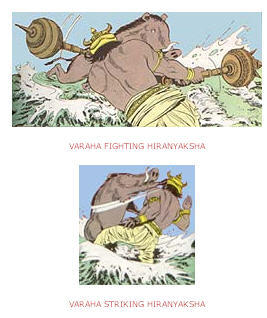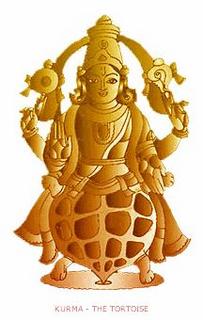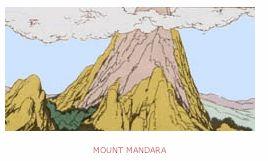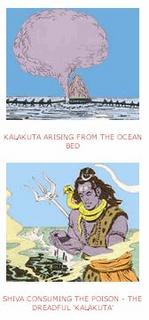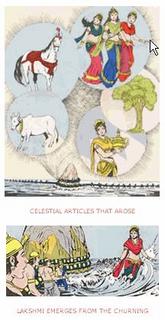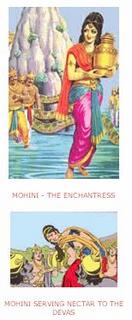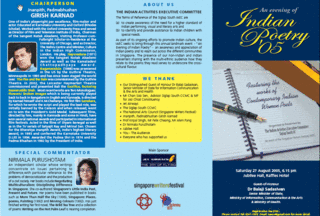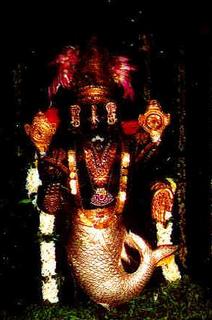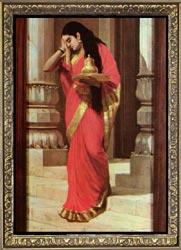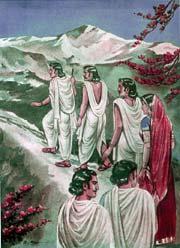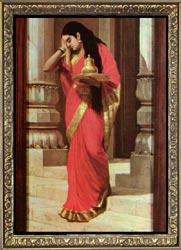Narasimha - The 4th Avatar
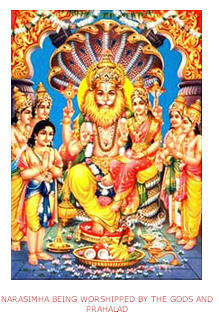 Narasimha, the fourth incarnation of god Vishnu, is half-lion half-human and provides a very fascinating study of Vishnu’s incarnation in order to alleviate the sufferings of devotees.
Narasimha, the fourth incarnation of god Vishnu, is half-lion half-human and provides a very fascinating study of Vishnu’s incarnation in order to alleviate the sufferings of devotees.
Among descendants of Daksha, the first man that Brahma created, there was one Kashyap, a sage, who had four wives, Diti, Aditi, Vinita and Kudroo. Diti gave birth to demons and from Aditi were born gods, while from Vinita was born Garud, the carrier of Vishnu and the last one Kudroo created the hydras.
Out of the demons born of Diti, two were with terrific powers. These two brothers were named Hiranyaksha and Hiranyakashipu. Both of them performed so many religious practices and austerities that in course of time they gained limitless powers. Hirayanyaksha proud with his powers attacked Vishnu who was in his Varaha form and was killed. Talk of being an arrogant prick!
HIRANYAKASHIPU - THE ASURA KING
At the death of Hiranyaksha his wife Vrishadbhanu and her children were overpowered with grief. His mother Dithidevi was heart-broken. Hiranyakashipu also was filled with sorrow. But he tried to console the others.  He said, "everyone has to die. So do not weep. My brother fought and died like a hero. So why weep for his death?". Although Hiranyakashipu tried to console others his sorrow burnt his own heart like fire. Even, before this, Hiranyakashipu hated Vishnu. Now Vishnu’s very name was like poison to him. His blood was boiling with the hatred of Vishnu.
He said, "everyone has to die. So do not weep. My brother fought and died like a hero. So why weep for his death?". Although Hiranyakashipu tried to console others his sorrow burnt his own heart like fire. Even, before this, Hiranyakashipu hated Vishnu. Now Vishnu’s very name was like poison to him. His blood was boiling with the hatred of Vishnu.
HIRANYAKASHIPU’S PENANCE
He called the generals of his army Illyala, Namuchi and others. He said, ‘Give the devotees of Vishnu as much trouble as you can.’ They burnt the cities; razed temples to the ground and destroyed the crops.
Hiranyakashipu King of the Rakshasas retired to the mountain Mandara and began Tapas (meditation and not spanish snacks). He stood on the toe so as to throw the whole weight of the body on it, held the arms raised straight and the eyes looking up at the sky. Thus he offered a severe prayer.  Many years passed. But he did not move even an inch. Flame rose from his body and enveloped the entire universe. Rivers and oceans boiled. The earth shook. Fire spread on all sides. The very gods were filled with fear. They went to Satyaloka and prayed to Brahma to save them. Brahma appeared to Hiranyakashipu and said, ‘Hiranyakashipu, arise. I am pleased with your devotion. I never saw before such a severe meditation. Ask for whatever you desire.’
Many years passed. But he did not move even an inch. Flame rose from his body and enveloped the entire universe. Rivers and oceans boiled. The earth shook. Fire spread on all sides. The very gods were filled with fear. They went to Satyaloka and prayed to Brahma to save them. Brahma appeared to Hiranyakashipu and said, ‘Hiranyakashipu, arise. I am pleased with your devotion. I never saw before such a severe meditation. Ask for whatever you desire.’
BRAHMA GRANTING THE BOON TO HIRANYAKASHIPU
Brahma sprinkled holy water over the body of the king. At once it shone like gold. Tears of gratitude filled with his eyes. He was so full of joy that at first he could not speak. Then he spoke with much effort, ‘Lord, you bestow light on the dark world; you are the creator of all, the protector of all, and, finally, you are the destroyer of all. You are all powerful;  you know everything. You are free from defects. No god is easily moved like you to take pity on his devotees and to grant them boons. I bow to you humbly.’ Brahma was pleased with his devotion. He said ‘Why have you undertaken such a severe Tapas’. Hiranyakashipu replied, “Great Lord, if you will grant my prayer, this is what I seek: Let not death come to me from any creature created by you; let me not meet with death either in the house or outside it; let not my death occur either during the day or at night; no weapon should cause my death; I should not die either on land or in the sky.” Note that this king was asking immortality but in a different form. The trinity cannot grant outright immortality to a mortal. Upsets the balance of proportion, I guess. You wonder why even grant a wish to an evil man.
you know everything. You are free from defects. No god is easily moved like you to take pity on his devotees and to grant them boons. I bow to you humbly.’ Brahma was pleased with his devotion. He said ‘Why have you undertaken such a severe Tapas’. Hiranyakashipu replied, “Great Lord, if you will grant my prayer, this is what I seek: Let not death come to me from any creature created by you; let me not meet with death either in the house or outside it; let not my death occur either during the day or at night; no weapon should cause my death; I should not die either on land or in the sky.” Note that this king was asking immortality but in a different form. The trinity cannot grant outright immortality to a mortal. Upsets the balance of proportion, I guess. You wonder why even grant a wish to an evil man.
After this blessing the demon crossed all bounds in oppression and dethroned Indra, the king of heavens. Indra in the company of all the gods appeared before Brahma and prayed for deliverance. Brahma was very much worried and replied that the demon had become powerful due to the blessings bestowed by him and he could not destroy him. He also advised Indra to go to Vishnu, which they did. The gods went to Vishnu and retold their story of sufferings and said that due to boons given by Brahma the demon had been indulging in all sorts of oppression. Vishnu promised to destroy him in due course of time.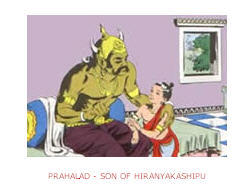 Hiranyakashipu had a son named Prahalad. This boy right from his very childhood was attracted towards Vishnu and other gods. Prahalad had not obeyed the orders of his father not to worship Vishnu.
Hiranyakashipu had a son named Prahalad. This boy right from his very childhood was attracted towards Vishnu and other gods. Prahalad had not obeyed the orders of his father not to worship Vishnu.
His father tried to destroy his son in fits of anger; tying a stone to Prahalad’s body he was thrown in the river but Vishnu himself came and stopped him from drowning and dying. Hiranyakashipu later tried to get Prahalad trampled under the feet of an elephant but the elephant lifted Prahalad lovingly by the help of his trunk and put him on its back. He then built a house and putting Prahalad into it set the same to fire; even this could not harm Prahalad. The father even tried to poison the son but to no avail.
At last the king thundered at the boy, “You curse of the family! Have you not yet given up your evil thoughts? The three worlds tremble at my glance. But you, my son, how did you dare to disobey me? You are very young; some one must have misled you and encouraged you. Otherwise you would not have had such evil ideas and such courage. Speak the true who has shown you such an evil path.” 
The earth shook as the king roared at the boy. But Prahalada calmly replied, “Dear father, it was Hari who gave me this courage. He is stronger than any one else. You and I, the universe, even Brahma is as nothing before his strength. He is the real Lord of the Universe.”
NARASIMHA - THE MAN-LION BURSTING OUT OF THE
PILLAR
All the gods were under the thumb of the mighty Hiranyakasipu; and here was a mere boy of five giving him advice. The king of the Rakshasas was mad with anger. He shouted in rage: “Unlucky fool, your death is near. I am the Lord of all the worlds, the only master. Is there another ? Where is he? Show him to me.” “He is everywhere,” young Prahlada’s answer came without a moment’s delay. The king could no longer control himself through anger.
“Wicked fellow, is he everywhere? You mad boy, why should he not appear to me in this pillar? I am, going to kill you this very moment. You have been praising Hari as the Lord of the Universe. Let him come to your help if he can.” So saying he drew out his sword and pounced upon the little boy. 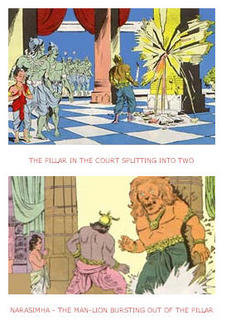 Then there was a terrible deafening noise as if the universe itself split into two. Even the very brave Hiranyakashipu started from his place at the terrible noise. The courtiers shook with fear and stood like statues of stone. As the stunned men watched, the pillar split into two. There was Sri Hari, in the form of Narasimha. He had the head of a lion and the body of a man. The eyes of this terrible figure were dazzling they looked like molten gold. The hair on the head and the moustache and the beard stood straight and erect. The sharp and pointed jaws chattered harshly; the tongue quivered like a sword and was sharp as a dagger. His eyebrows were close knit. The ears were raised and stood erect. The mouth gaped like a mountain cave. The two nostrils looked like wells turned upside down. The body was huge and mountain - like. It seemed to touch the skies and to stop the very clouds. It had countless arms. The body was covered with white like silver. The very sight of the sharp claws made one tremble.
Then there was a terrible deafening noise as if the universe itself split into two. Even the very brave Hiranyakashipu started from his place at the terrible noise. The courtiers shook with fear and stood like statues of stone. As the stunned men watched, the pillar split into two. There was Sri Hari, in the form of Narasimha. He had the head of a lion and the body of a man. The eyes of this terrible figure were dazzling they looked like molten gold. The hair on the head and the moustache and the beard stood straight and erect. The sharp and pointed jaws chattered harshly; the tongue quivered like a sword and was sharp as a dagger. His eyebrows were close knit. The ears were raised and stood erect. The mouth gaped like a mountain cave. The two nostrils looked like wells turned upside down. The body was huge and mountain - like. It seemed to touch the skies and to stop the very clouds. It had countless arms. The body was covered with white like silver. The very sight of the sharp claws made one tremble.
HIRANYAKASHIPU ATTACKING NARASIMHA
This terrible form split the pillar and came out. Hiranyakashipu’s courtiers had crowded the hall; but not one dared to look at him, not to speak of approaching him. And yet, Hiranyakashipu steadily looked him in the face. His was extraordinary courage. He understood what was going to happen.  “Oh, this is Mahavishnu. This is the very god who killed my brother assuming the form of a wild pig. If I kill him all the gods will be helpless; they will be like the branches of a tree whose trunk has been cut and removed. Well, I shall test his strength.” So thinking he raised his mace and fell upon Narasimha. Without doubt, Hiranyakashipu was a man of extraordinary strength and courage. But what could he do against Lord Narasimha? He was like a little sparrow dashing against a mountain. That god of immense power seized the Rakshasa as easily as Garuda seizes a snake. But the Rakshasa slipped from his grip like a snake.
“Oh, this is Mahavishnu. This is the very god who killed my brother assuming the form of a wild pig. If I kill him all the gods will be helpless; they will be like the branches of a tree whose trunk has been cut and removed. Well, I shall test his strength.” So thinking he raised his mace and fell upon Narasimha. Without doubt, Hiranyakashipu was a man of extraordinary strength and courage. But what could he do against Lord Narasimha? He was like a little sparrow dashing against a mountain. That god of immense power seized the Rakshasa as easily as Garuda seizes a snake. But the Rakshasa slipped from his grip like a snake.
NARASIMHA LIFTING THE ASURA TO THE THRESHOLD AND TEARING HIS BODY WITH HIS NAILS
Narasimha caught him again like a snake seizing a mouse; with a loud roar he carried Hiranyakashipu to the threshold of the hall. He sat on the threshold with the Rakshasa in his lap. Then he dug his nails deep into his body and tore it open. He took out the entrails and wore them round his neck. Thus the wicked Asura was finally killed by the hands of the man-lion, Vishnu.
All this while the bodyguards and the other courtiers had stood speechless and motionless in paralyzing fear. But at the death of their king they sprang to action. In fierce rage, they fell on Narasimha in a body. But all were crushed into a lump of flesh in the winking of an eye.
After the enemies were all destroyed, Narahari (Vishnu) sat on the throne of the Rakshasa King, glaring at those around him. The gods showered flowers from heaven. The Gandharva sang divine music and the Apsaras, the dancers of heaven, danced in joy. All earth rejoiced. But the terrible anger of Narasimha did not diminish. Even Goddess Lakshmi, Lord Vishnu’s wife, was afraid to go near him. The little boy Prahalad touched the feet of Narasimha with his head, in deep devotion. At the tender touch of Prahalad the Lord was pleased. He grew calm. Anger gave way to kindness. Narasimha kissed the boy softly and raised him gently. The gods praised Vishnu’s ways. “Hiranyakashipu got boons from Lord Brahma; and Narasimha has respected all the promises. For it is now twilight, which is neither day nor night; the place is neither outside the house nor inside it, it is the threshold. Again he was killed neither on land nor in the sky, but on the lap of the god; he was killed neither by weapons nor by missiles but torn by nails; no one created by Brahma has killed him nor was he born in the wombs by ordinary course; it is Vishnu, in the form of Narasimha, who slew him. O wonder of wonders!” so they sang the praise of the Lord. Prahalad was in tears and asked Narasimha about the fate of his father in the after-life. Vishnu assured the devotee that as He, the Lord himself had killed the father; the latter would surely go to heaven. Vishnu also gave a blessing to Prahalad that now onwards none of his race would die by the hands of Vishnu.



